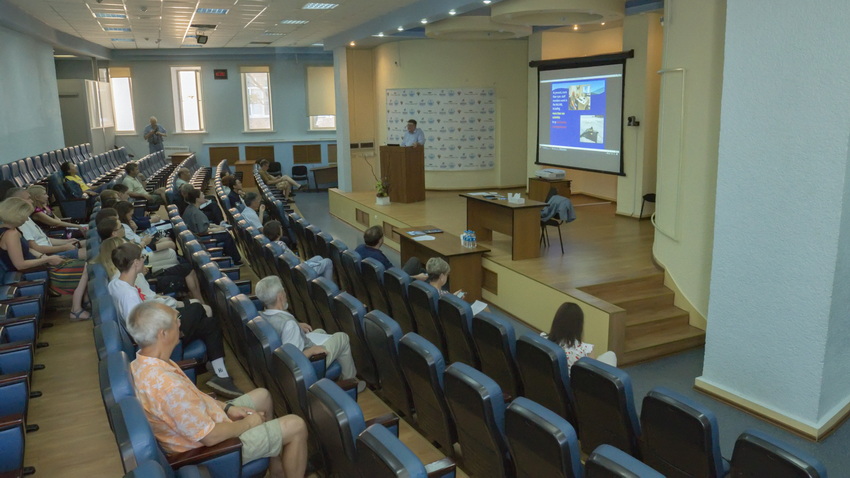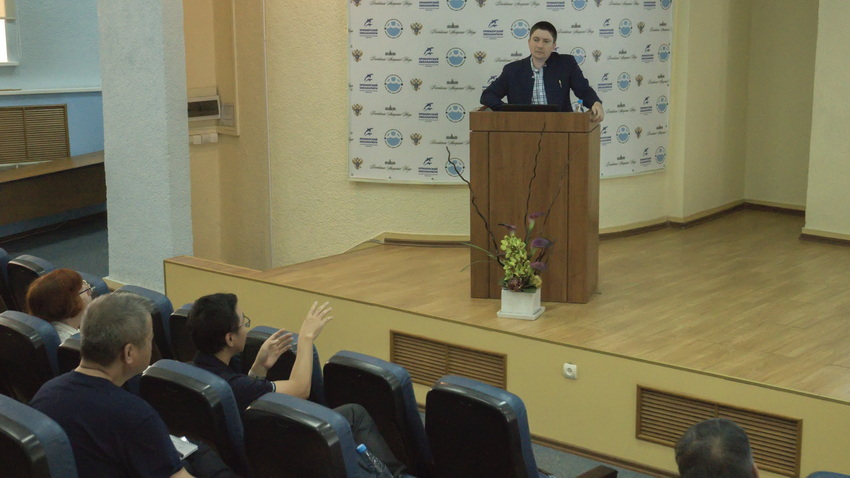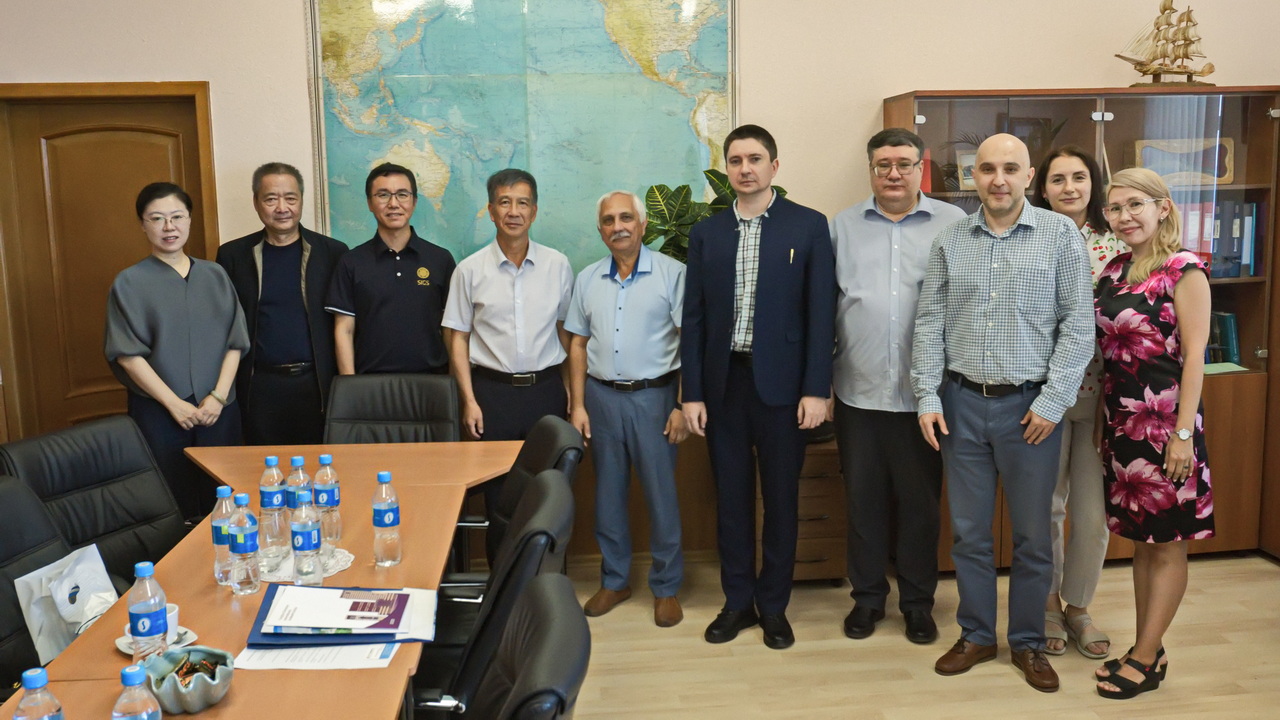On July 8, a Russian-Chinese seminar on marine ecology was held at the A.V. Zhirmunsky National Scientific Center of Marine Biology, Far Eastern Branch, Russian Academy of Sciences (NSCMB FEB RAS) as part of the Center's cooperation with Tsinghua University (PRC). A delegation from the Tsinghua Shenzhen International Graduate School (SIGS Tsinghua) visited the NSCMB FEB RAS for the first time to discuss scientific and educational cooperation.

The delegation was headed by Dr. Zuo Jiane, an Associate Dean of the SIGS Tsinghua. The meeting was also attended by the following representatives from the Chinese side: Dr. Wang Yong, an Associate Dean of Institution for Ocean Engineering at SIGS Tsinghua; Dr. Cai Zhonghua, a Researcher of the Institution for Ocean Engineering at SIGS Tsinghua; and Dr. Jiang Yuelu, an Associate Professor of the Institution for Ocean Engineering, SIGS Tsinghua.
In his opening remarks at the bilateral seminar, Igor Yuryevich Dolmatov, the Director of the NSCMB FEB RAS, a Corresponding Member of the RAS, welcomed the guests on behalf of the administration and staff of the Center. As a reminder, the previous meeting between NSCMB FEB RAS scientists and representatives of the Tsinghua University took place in November 2024. Igor Yuryevich then handed the floor to Dr. Konstantin Anatolyevich Lutaenko, the Deputy Director for International Cooperation .
In his response speech and in the following report, Dr. Zuo Jiane noted that the Tsinghua University is one of the leading universities under the Ministry of Education of China. Its history began more than a century ago and is inextricably linked to the development of modern education in the country. In his presentation, the speaker specifically focused on the University’s campus in Beijing, which covers more than 22 hectares and is famous for its picturesque surroundings and architectural complexes. The campus is regarded as one of the most beautiful in Asia. The speaker emphasized that the Tsinghua University is the largest center of higher education, with well-developed undergraduate and graduate programs and active scientific research. It ranks among the world’s top 20 universities according to the QS World University Rankings and holds the number 1 position in Asia. Today, the University's research teams conduct studies across a wide range of disciplines, are part of key national laboratories, and receive support through national science and technology awards and research funds. The University cooperates with dozens of universities and research institutes in 50 countries, providing students with opportunities for international exchange and internships. The University includes the Tsinghua Shenzhen International Graduate School, located in Shenzhen (Guangdong Province).

In turn, from the Center's side, Dr. K. A. Lutaenko and Dr. A. V. Boroda, a Deputy Director for Science, made presentations during the ongoing seminar. Dr. Lutaenko spoke about the history of the formation of the Scientific Center, which currently employs about 1,500 people. In addition to its scale, the Center’s publication activity is also noteworthy: since the establishment of the Branch and the Institute of Marine Biology in 1967, the Center has published more than 150 monographs and 10,000 articles in Russian and foreign journals, making it one of the leaders in its field in Russia. The speaker paid special attention to the long-term partnership with a number of scientific institutions of the Chinese Academy of Sciences (CAS). Konstantin Anatolyevich emphasized that the participation by NSCMB FEB RAS employees in past bilateral meetings and conferences helped them understand the main research areas of leading Chinese centers and specialists in deep-sea biology and to identify overlapping scientific interests. As a result, in 2024, the first joint Chinese-Russian deep-sea expedition was successfully carried out.
Dr. Boroda spoke about the research directions and key results in the study of marine mammal physiology over the past 12 years. Concluding the Russian-Chinese seminar, Dr. Lutaenko expressed hope that the cooperation between China and Russia will expand, exchanges in the scientific and educational spheres will deepen, and joint deep-sea expeditions will successfully continue.

During the visit, the delegation members were escorted to the office of the Director of the NSCMB FEB RAS, where a brief working meeting was held to discuss initiatives for the development of future mutually beneficial cooperation. The meeting was attended by the Director Dolmatov; Dr. Lutaenko; Dr. V. V. Mordukhovich, a Deputy Directors for Science; Dr. Boroda; Ms. A. I. Grishina, a Leading Engineer of the ICD of NSCMB FEB RAS; and Ms. Yu. A. Trebukhova, a Chief Specialist of the Scientific and Organizational Department.

The Chinese colleagues once again expressed their gratitude for the warm reception. The participants discussed areas of cooperation and educational opportunities for students and lecturers from both countries. The meeting concluded with an agreement to intensify working contacts, including the possibility of reciprocal visits to China. “I believe we have much to offer each other,” emphasized Mr. Wang Yong.
At the end of the working meeting, the parties exchanged souvenirs. After the official part, the guests visited the Museum of NSCMB FEB RAS, where they were given a brief introductory tour by the Head of the Museum, Vadim Pokrovsky. The busy program of the Chinese colleagues also included a tour of the Primorsky Aquarium, a branch of NSCMB FEB RAS, which included visits to scientific laboratories.
The organization of the Chinese delegation’s visit to the NSCMB FEB RAS was a natural continuation of the long-standing and reliable partnership between the two countries. Scientific, educational, and technical cooperation offers an opportunity to exchange experience in these areas. Such meetings promote collaboration and knowledge sharing, create space for direct communication, and foster establishment of mutual contacts.